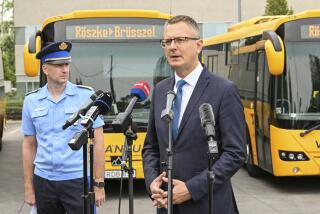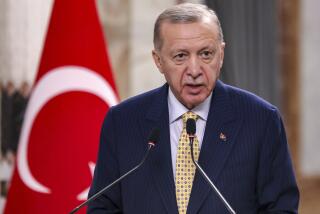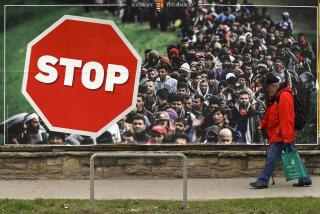EU presses Turkey on human rights and other issues; President Erdogan demands membership decision
The European Union on Wednesday criticized Turkey for democratic “backsliding” after an attempted coup and warned that its candidacy for membership in the bloc was in jeopardy if a crackdown on the judiciary, parliament and the media were not reversed.
In a bitter retort, Turkish President Recep Tayyip Erdogan challenged the 28-nation EU to decide once and for all if it wants Turkey, which has been seeking membership for decades, to join.
“They shamelessly say that Turkey’s EU negotiations should be reviewed,” Erdogan said. “Review it as soon as possible. But do not just review. Make your decision.”
The sharp exchange came amid a growing political crisis in Turkey, as Erdogan, taking advantage of a state of emergency after the July coup attempt, supported the arrest of 10 Kurdish members of parliament and the detention of nine journalists and executives of the newspaper Cumhuriyet, one of the last independent news outlets.
The opposition Republican People’s Party said the arrests of the lawmakers were unconstitutional and called for the release of the journalists. Party leader Kemal Kilicdaroglu issued a declaration saying: “No to coups, no to dictatorship, long live democracy.”
Erdogan retorted that those “who betray this nation … should pay for it,” and his prime minister, Binali Yildirim, dismissed the criticism as “vileness.”
There is also a growing security crisis, with Islamic State extremists and the Kurdistan Workers Party blamed for violent attacks on civilian targets.
The EU report, which is issued annually, took exception to Erdogan’s actions after the failed coup, which have included suspending or firing about 110,000 civil servants, judges, teachers, journalists and soldiers, political interference in the judiciary and stepped-up pressure on the country’s remaining free media.
The EU’s top enlargement official, Johannes Hahn, said the coup attempt “was an attack on democracy per se” and a swift reaction was “legitimate” in light of the seriousness of the situation.
“However, the large scale and collective nature of measures taken over the last months raise very serious concerns,” he said.
The report used the word “backsliding” 103 times, referring to setbacks in the rule of law, human rights, freedom of expression and the independence of the judiciary.
It said amendments approved by parliament, where Erdogan’s Justice and Development Party has an absolute majority, had turned the Court of Cassation, an appeals court, and the Council of State, which reviews administrative court judgments, into tools of the executive. It also said that torture and ill treatment of political detainees were on the rise. Also noted were the moves in parliament to restore the death penalty — a direct violation of EU basic principles.
The report criticized the exclusion of members of the pro-Kurdish People’s Democratic Party, or HDP, from meetings of parliamentary commissions and voiced serious concern over last week’s arrests of lawmakers accused of ties to the separatist Kurdistan Workers Party, or PKK, which the EU, the U.S. and Turkey have branded as a terrorist group. The government and the PKK are engaged in combat in southern Turkey, but the report said the only solution to the Kurdish issues was a political settlement.
“These various actions … seem to be incompatible with Turkey’s official desire to become a member of the European Union,” Hahn said in Brussels. “It is time Ankara tells us what they really want.”
The report also chided the government for not investigating major corruption allegations implicating Erdogan dating to 2013.
Despite the rhetoric, the two sides appear to need each other, especially to handle the refugee crisis growing out of the war in Syria.
Turkey, which has 3 million refugees, agreed with the EU in March to block migrants from embarking across the Aegean Sea to seek refuge in Europe in exchange for visa-free travel by Turks to EU countries, which has yet to come about. Undoing that accord would unleash a crisis that neither side wants.
The report said the government has failed to produce convincing evidence to justify the dismissals of so many officials reputedly linked to Fethullah Gulen, the Muslim cleric living in self-imposed exile in the United States whom Erdogan blames for the putsch.
Erdogan has demanded that the U.S. extradite Gulen to face trial, but the EU report is expected to add to the skepticism in Washington that Turkish authorities have a solid case against him.
Top EU officials are expected to visit Ankara in coming days, among them Federica Mogherini, the high representative of the European Union for foreign affairs.
As Turkey’s EU minister, Omer Celik, put it, the report was not drafted in a manner “that serves relations between the EU and Turkey.” He added: “We are faced here with a report that is far from being constructive and offering a way forward.”
Gutman is a special correspondent. Special correspondent Duygu Guvenc in Ankara contributed to this report.
More to Read
Sign up for Essential California
The most important California stories and recommendations in your inbox every morning.
You may occasionally receive promotional content from the Los Angeles Times.









